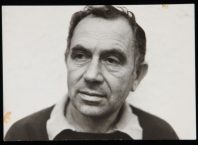I love cafés. It’s where academic life meets passion. The noise and tumult veils the soul from the world and enables deeper concentration than a large, well-appointed office affords. There’s just one problem: I hate coffee. The aroma gives me a headache. The bitter taste makes my facial muscles contract. My ideal coffee recipe would be: take a quarter teaspoon of coffee from the large round red container (the one that replaced the blue container as a symbol of Zionism), add a bit of milk and fill to the brim with boiling water.
In Israel I ask the waiter for “diluted instant coffee”, “children’s coffee” or “brown colored water” and all that I desire flows to the table. In the US I have a problem. There is not a single café in New York that sells instant coffee. The American counterpart is filtered coffee that is generously poured from a wide glass carafe. Coffee lovers complain that the coffee is too weak. For a coffee-phobe like me it is almost as unbearable as a double espresso. I suffered for years until I discovered a liberating formula: asking for a large mug filled with one-fourth coffee, three-fourths water and a bit of milk.
I apologize to the reader for exposing the existential problems I contend with – the description is necessary in order to understand the “scientific” experiment that I am conducting throughout the great metropolis regarding the cost of my diluted coffee. At the outset, it did not occur to me that the price of the diluted coffee should be lower than that of a regular cup. As an “economist” I had internalized the understanding that price is not necessarily relative to the cost of production and is affected by demand. In my own case I would have been willing to pay several times the price. Actually, it is not at all clear that the cost of preparing my coffee is less than that of other customers. The savings in coffee grains is infinitesimal in comparison to the cost of employee labor involved in comprehending my odd request. On the other hand, had I been asked to pay extra for “special treatment” I would have felt like a persecuted minority: I have as much right to pour brown water into my body as coffee aficionados have to their macchiato.
In no establishment where the price of coffee is more than $4.50 did anyone feel the need to offer me a discount
I was astonished when coffee sellers insisted on taking less than the asking price for a cup of coffee. It goes like this: I explain what I would like and the seller cannot comprehend my request. I repeat it once, twice, perhaps three times until he finally understands. He brings me the coffee flavored water and asks for a dollar. I offer to pay the full price, a dollar fifty, but soon surrender to the generous gesture of the person behind the counter. Just this minute the woman behind the counter refused to take any money at all for my brown gold (and no, I don’t look anything like a homeless person).
My addiction to dilution has enabled me to study the phenomenon. Here is my summary: the chance that the price of my adulterated coffee will be lower than the regular price grows when the price of the coffee is lower. When the price of a cup of coffee is more than two dollars, I am requested to pay full price. In no establishment where the price of coffee is more than $4.50 did anyone feel the need to offer me a discount, even when I only asked for hot water with some milk (skim). But sidewalk coffee-sellers, Pakistani immigrants, young waiters in stained aprons working in anonymous cafés where coffee costs less than two dollars, insist on taking even less. Several economists tried to convince me that it is a marketing gimmick. So I checked: the same scenario repeated itself even when it was clear that I was a one-time customer unlikely ever to return to the same café As usual, economists have difficulty understanding that the rest of the world is not as narrow as their own.
What have I learned from my field research? Despite their low pay and fear of losing the source of their income, there are many people in America who are sensitive to justice as well as profits. These people may not have worked in financial firms on Wall Street, but they are no less part of America than CEOs with golden parachutes. In short, even America isn’t exactly as I imagined it to be. That too, is a source of hope.
This article appeared in Hebrew in Yedioth Ahronoth
Image credit: Ariel Rubinstein
Ariel Rubinstein is a Professor of Economics at Tel Aviv and New York Universities, but he sees himself as a member of the University of Tel Aviv cafes as is evident from his website http://arielrubinstein.tau.ac.il . His domain of research is economic theory. He occasionally writes in Yedioth Achronot. His book, “Agadot Hakalkala” was recently published by Kinneret Zmora-Bitan Dvir.







Is tea not an option? Into cafes and not coffee? It’s like visiting an art museum cause you like the atmosphere, which still makes sense to my mind.
Comments are closed.